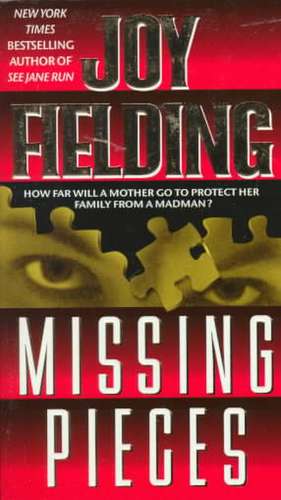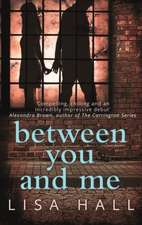Missing Pieces
Autor Joy Fieldingen Limba Engleză Paperback – 30 iun 1998
An unrivaled master of psychological suspense, Joy Fielding has written her most chilling and intricate novel yet--a compulsively readable look at the razor-thin line between daily domesticity and nerve-shattering terror.
It had to end in blood. Family therapist Kate Sinclair, healer of lost souls, perfect wife and mother, has suddenly become trapped in a nightmare of her own. Her teenage daughter has just discovered sex, lies, and rebellion. Her ex-boyfriend has returned to threaten her marriage. Her once-peaceful hometown is being awakened by chilling headlines: Another woman is missing. Kate can sense the darkness gathering around her, can see the mistakes, the missteps, the missing pieces. She is afraid of what tomorrow will bring.
Enter Colin Friendly, a man on trial for abducting and killing thirteen women--the handsome, "misunderstood" sociopath Kate's troubled sister plans to marry. Colin loves women to death. He can't wait to see Kate and the girls again. One dark night when they are home alone, disarmed, ready for bed...
Preț: 55.18 lei
Nou
Puncte Express: 83
Preț estimativ în valută:
10.56€ • 10.98$ • 8.72£
10.56€ • 10.98$ • 8.72£
Carte disponibilă
Livrare economică 24 martie-07 aprilie
Preluare comenzi: 021 569.72.76
Specificații
ISBN-13: 9780440222873
ISBN-10: 0440222877
Pagini: 432
Dimensiuni: 107 x 175 x 31 mm
Greutate: 0.21 kg
Editura: Island
ISBN-10: 0440222877
Pagini: 432
Dimensiuni: 107 x 175 x 31 mm
Greutate: 0.21 kg
Editura: Island
Notă biografică
Joy Fielding is the author of Don't Cry Now, Tell Me No Secrets, See Jane Run, Good Intentions, The Deep End, Life Penalty, The Other Woman, Kiss Mommy Goodbye, Trance, The Transformation, and The Best of Friends. A graduate of the University of Toronto, she lives with her family in Toronto and Palm Beach.
Extras
Another woman is missing.
Her name is Millie Potton and she was last seen two days ago. According to today's paper, Millie is tall and thin and walks with a slight limp. She is fifty-four years old, which isn't surprising. Only women over fifty have names like Millie anymore.
The small article on page three of the local news section of the Palm Beach Post states that she was last seen wandering down the street in her bathrobe by a neighbor, a woman who obviously saw nothing particularly peculiar in the incident. Millie Potton, the article continues, has a long history of mental problems, the implication being that it is these mental problems that are responsible for her disappearance and are not therefore anything the rest of us have to be concerned about.
Over two dozen women have disappeared from the Palm Beach area in the last five years. I know because I've been keeping track, not consciously, at least not at first, but after a while their numbers just started adding up, and a vague figure affixed itself to my conscious mind. The women range in age from sixteen to sixty. The police have dismissed some as runaways, especially the younger ones, girls like Amy Lokash, age seventeen, who left a friend's house at ten o'clock one evening and was never seen or heard from again. Others, and Millie Potton will undoubtedly be among them, have been dismissed for any number of indisputably logical reasons, even though the police were wrong about Amy Lokash.
Still, until a body turns up somewhere, stuffed into a garbage bin behind Burger King like Marilyn Greenwood, age twenty-four, or floating facedown in a Port Everglades swamp like Christine McDermott, age thirty-three, there really isn't anything the police can do. Or so they say. Women, it seems, go missing all the time.
It's quiet in the house this morning, what with everybody gone. I have lots of time to tape my report. I call it a report, but really it isn't anything so clearly defined. It's more a series of reminiscences, although the police have asked me to be as specific and as orderly as I can, to be careful not to leave anything out, no matter how insignificant--or how personal--something may seem. They will decide what is important, they tell me.
I'm not sure I understand the point. What's done is done. It's not as if I can go back and change any of the things that have happened, much as I'd like to, much as I tried to before they occurred. But I was just hitting my head against a brick wall. I knew it at the time. I know it now. There are certain things over which we have no control--the actions of others being the prime example. Much as we may not like it, we have to stand back and let people go their own way, make their own mistakes, no matter how clearly we see disaster looming. Isn't that what I'm always telling my clients?
Of course, it's much easier to give advice than it is to follow it. Maybe that's one of the reasons I became a family therapist, although that certainly wasn't the reason I gave on my college entry application. There, if memory serves me correctly, and it does so with alarmingly less frequency all the time, I listed my intense desire to help others, my reputation among friends as someone to whom they could always turn in times of trouble, my experience with my own dysfunctional family, although the term "dysfunctional" had yet to be coined at the time I entered university way back in 1966. It's so common now, so much a part of the everyday vernacular, that it's hard to imagine how we managed for so long without it, despite the fact that it's essentially meaningless. What constitutes dysfunction, after all? What family doesn't have problems? I'm certain my own daughters could give you an earful.
So, where to start? This is what my first-time clients ask all the time. They come into my office, which is on the third floor of a five-story Pepto-Bismol pink building on Royal Palm Way, their eyes wary, the fingers of one hand chipping at the wedding band on the other, as they perch on the ends of the upholstered gray-and-white chairs, their lips parting in anticipation, their mouths eager to give voice to their rage, their fears, their displeasure, and the first thing that tumbles out is always the same: Where do I start?
Do I start at the very beginning, announce myself like a label stuck to a lapel: Hello, my name is Kate Sinclair? Do I say that I was born forty-seven years ago in Pittsburgh on an uncharacteristically warm day in April, that I'm five feet six and a half inches tall and one hundred and twenty-five pounds, that my hair is light brown and my eyes a shade darker, that I have small breasts and good legs and a slightly lopsided smile? That Larry affectionately calls me funny face, that Robert said I was beautiful?
It would be much easier to start at the end, to recite facts already known, give name to the dead, wipe away the blood once and for all, instead of trying to search for motivations, for explanations, for answers that might never be found.
But the police don't want that. They already know the basic facts. They've seen the end results. What they want are details, and I've agreed, as best I can, to provide them. I could start with Amy Lokash's disappearance, or the first time her mother came to my office. I could begin with my mother's fears she was being followed, or with the day Sara's teacher called to voice her growing concerns about my daughter's behavior. I could talk about that first phone call from Robert, or Larry's sudden trip to South Carolina. But I guess if I have to choose one moment over all the others, it would have to be that Saturday morning last October when Jo Lynn and I were sitting at the kitchen table, relaxing and enjoying our third cup of coffee, and my sister put down the morning paper and calmly announced that she was going to marry a man who was on trial for the murder of thirteen women.
Yes, I think I'll start there.
Her name is Millie Potton and she was last seen two days ago. According to today's paper, Millie is tall and thin and walks with a slight limp. She is fifty-four years old, which isn't surprising. Only women over fifty have names like Millie anymore.
The small article on page three of the local news section of the Palm Beach Post states that she was last seen wandering down the street in her bathrobe by a neighbor, a woman who obviously saw nothing particularly peculiar in the incident. Millie Potton, the article continues, has a long history of mental problems, the implication being that it is these mental problems that are responsible for her disappearance and are not therefore anything the rest of us have to be concerned about.
Over two dozen women have disappeared from the Palm Beach area in the last five years. I know because I've been keeping track, not consciously, at least not at first, but after a while their numbers just started adding up, and a vague figure affixed itself to my conscious mind. The women range in age from sixteen to sixty. The police have dismissed some as runaways, especially the younger ones, girls like Amy Lokash, age seventeen, who left a friend's house at ten o'clock one evening and was never seen or heard from again. Others, and Millie Potton will undoubtedly be among them, have been dismissed for any number of indisputably logical reasons, even though the police were wrong about Amy Lokash.
Still, until a body turns up somewhere, stuffed into a garbage bin behind Burger King like Marilyn Greenwood, age twenty-four, or floating facedown in a Port Everglades swamp like Christine McDermott, age thirty-three, there really isn't anything the police can do. Or so they say. Women, it seems, go missing all the time.
It's quiet in the house this morning, what with everybody gone. I have lots of time to tape my report. I call it a report, but really it isn't anything so clearly defined. It's more a series of reminiscences, although the police have asked me to be as specific and as orderly as I can, to be careful not to leave anything out, no matter how insignificant--or how personal--something may seem. They will decide what is important, they tell me.
I'm not sure I understand the point. What's done is done. It's not as if I can go back and change any of the things that have happened, much as I'd like to, much as I tried to before they occurred. But I was just hitting my head against a brick wall. I knew it at the time. I know it now. There are certain things over which we have no control--the actions of others being the prime example. Much as we may not like it, we have to stand back and let people go their own way, make their own mistakes, no matter how clearly we see disaster looming. Isn't that what I'm always telling my clients?
Of course, it's much easier to give advice than it is to follow it. Maybe that's one of the reasons I became a family therapist, although that certainly wasn't the reason I gave on my college entry application. There, if memory serves me correctly, and it does so with alarmingly less frequency all the time, I listed my intense desire to help others, my reputation among friends as someone to whom they could always turn in times of trouble, my experience with my own dysfunctional family, although the term "dysfunctional" had yet to be coined at the time I entered university way back in 1966. It's so common now, so much a part of the everyday vernacular, that it's hard to imagine how we managed for so long without it, despite the fact that it's essentially meaningless. What constitutes dysfunction, after all? What family doesn't have problems? I'm certain my own daughters could give you an earful.
So, where to start? This is what my first-time clients ask all the time. They come into my office, which is on the third floor of a five-story Pepto-Bismol pink building on Royal Palm Way, their eyes wary, the fingers of one hand chipping at the wedding band on the other, as they perch on the ends of the upholstered gray-and-white chairs, their lips parting in anticipation, their mouths eager to give voice to their rage, their fears, their displeasure, and the first thing that tumbles out is always the same: Where do I start?
Do I start at the very beginning, announce myself like a label stuck to a lapel: Hello, my name is Kate Sinclair? Do I say that I was born forty-seven years ago in Pittsburgh on an uncharacteristically warm day in April, that I'm five feet six and a half inches tall and one hundred and twenty-five pounds, that my hair is light brown and my eyes a shade darker, that I have small breasts and good legs and a slightly lopsided smile? That Larry affectionately calls me funny face, that Robert said I was beautiful?
It would be much easier to start at the end, to recite facts already known, give name to the dead, wipe away the blood once and for all, instead of trying to search for motivations, for explanations, for answers that might never be found.
But the police don't want that. They already know the basic facts. They've seen the end results. What they want are details, and I've agreed, as best I can, to provide them. I could start with Amy Lokash's disappearance, or the first time her mother came to my office. I could begin with my mother's fears she was being followed, or with the day Sara's teacher called to voice her growing concerns about my daughter's behavior. I could talk about that first phone call from Robert, or Larry's sudden trip to South Carolina. But I guess if I have to choose one moment over all the others, it would have to be that Saturday morning last October when Jo Lynn and I were sitting at the kitchen table, relaxing and enjoying our third cup of coffee, and my sister put down the morning paper and calmly announced that she was going to marry a man who was on trial for the murder of thirteen women.
Yes, I think I'll start there.
Recenzii
"Fielding knows how to turn the screws of suspense."
--The Plain Dealer (Cleveland)
"Honest, strong narration [drives] this novel of a family in turmoil to its bloody if redeeming resolution."
--Publishers Weekly
"Fielding has made the woman-in-jeopardy genre her own."
--People
"An excellent piece of psychological suspense."
--Toronto Star
"Nightmarish...Fielding turns up the heat."
--Kirkus Reviews
A main selection of the Literary Guild and the Doubleday Book Club
--The Plain Dealer (Cleveland)
"Honest, strong narration [drives] this novel of a family in turmoil to its bloody if redeeming resolution."
--Publishers Weekly
"Fielding has made the woman-in-jeopardy genre her own."
--People
"An excellent piece of psychological suspense."
--Toronto Star
"Nightmarish...Fielding turns up the heat."
--Kirkus Reviews
A main selection of the Literary Guild and the Doubleday Book Club
Descriere
Family therapist Kate Sinclair repairs other people's troubled lives, all the while seeming to revel in her picture-perfect marriage and handsome home. But a closer look reveals that things are not as they seem. When her half-sister JoLynn announces plans to marry a man on trial for the murder of 13 women who have gone missing in the Palm Beach area, Kate's house of cards begins tumbling down. To say that nothing will ever be the same again is an understatement of the highest order.





